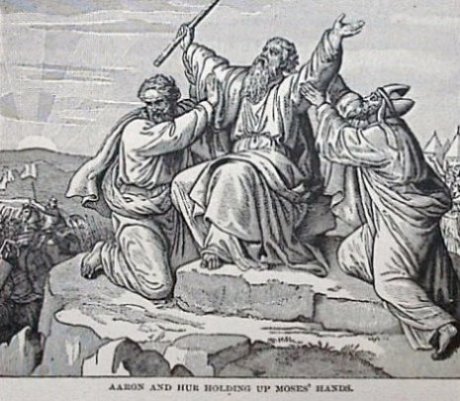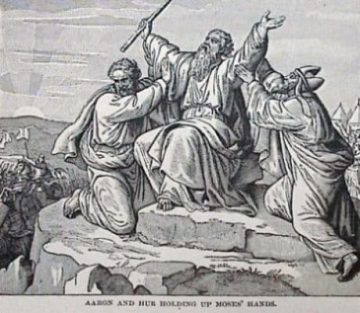 We’ll begin with a scripture story about the prophet Moses. His people were at war with the people of Amalek. Moses went up to a hill to watch the battle and brought his rod with him, the same one he had used when he cursed the Nile while persuading Pharaoh to free the Israelites, and that he had also used to strike the rock of Horeb so that it gushed water for the Israelites when they were in the desert and thirsty.
We’ll begin with a scripture story about the prophet Moses. His people were at war with the people of Amalek. Moses went up to a hill to watch the battle and brought his rod with him, the same one he had used when he cursed the Nile while persuading Pharaoh to free the Israelites, and that he had also used to strike the rock of Horeb so that it gushed water for the Israelites when they were in the desert and thirsty.
8 ¶Then came aAmalek, and fought with Israel in Rephidim.
9 And Moses said unto aJoshua, Choose us out men, and go out, fight with Amalek: to morrow I will stand on the top of the hill with the brod of God in mine hand.
10 So Joshua did as Moses had said to him, and fought with Amalek: and Moses, Aaron, and Hur went up to the top of the hill.
11 And it came to pass, when Moses held up his hand, that Israel prevailed: and when he let down his hand, Amalek prevailed.
12 But Moses’ hands awere heavy; and they took a stone, and put it under him, and he sat thereon; and Aaron and Hur bstayed up his hands, the one on the one side, and the other on the other side; and his hands were steady until the going down of the sun.
13 And Joshua adiscomfited Amalek and his people with the edge of the sword.
In the lesson text, George Albert Smith explains a way for us to apply this to our lives:
God grant that we who have been so bountifully blessed may hold up the hands of the servant of the Lord who presides over us; that we may help him not only by our faith and prayers but by loving kindness as opportunity offers; that we may march under the banner that he shall hold aloft as God continues to sustain him as President of the Church, as the prophet of the Lord in these latter days.20
Smith draws a parallel between the image of Aaron and Hur sustaining Moses by holding up his arms and our modern tradition of raising our own arms to vote to sustain our modern prophets and other church authorities.
We now have one order of business that is customary with these Conferences; that is, the presentation of the Authorities of the Church to be sustained by the vote of the people. I hope that you will realize, all of you, that this is a sacred privilege. … It will not be just a symbol but it will be an indication that, with the help of the Lord, you will carry your part of the work.
What does it mean to you to sustain Church leaders?
Sustaining Imperfect Leaders
Let’s turn to the next chapter of Exodus and read another account from Moses’ ministry.
Exodus 18:13-24
13 ¶And it came to pass on the morrow, that Moses sat to ajudge the people: and the people stood by Moses from the morning unto the evening.
14 And when Moses’ father in law saw all that he did to the people, he said, What is this thing that thou doest to the people? why sittest thou thyself alone, and all the people stand by thee from morning unto even?
15 And Moses said unto his father in law, Because the people come unto me to aenquire of God:
16 When they have a amatter, they come unto me; and I judge between one and another, and I do make them know the statutes of God, and his laws.
17 And Moses’ father in law said unto him, The thing that thou doest is not good.
18 Thou wilt surely wear away, both thou, and this people that is with thee: for this thing is atoo heavy for thee; thou art not able to perform it thyself alone.
19 Hearken now unto my voice, I will give thee counsel, and God shall be with thee: aBe thou for the people to bGod-ward, that thou mayest bring the causes unto God:
20 And thou shalt ateach them bordinances and claws, and shalt shew them the dway wherein they must ewalk, and the work that they must do.
21 Moreover thou shalt provide out of all the people aable men, such as bfear God, cmen of truth, hating dcovetousness; and place such over them, to be erulers of thousands, and rulers of fhundreds, rulers of fifties, and rulers of tens:
22 And let them ajudge the people at all seasons: and it shall be, that every great matter they shall bring unto thee, but every small matter they shall judge: so shall it be easier for thyself, and they shall bear the bburden with thee.
23 If thou shalt do this thing, and God command thee so, then thou shalt be able to endure, and all this people shall also go to their place in peace.
24 So Moses hearkened to the voice of his father in law, and did all that he had said.

Essentially, Moses’ father-in-law, Jethro, observed that Moses had a leadership style that could use some improvement. This organizational chart shows how Moses was leading the people, with very few tasks delegated to anyone but himself.

Jethro informed Moses that a leadership model that involved more of his congregation would be more effective, as represented by this organizational chart.
How did Jethro sustain Moses, in spite of disapproving of Moses’ leadership techniques?
How can we sustain church leaders who may not have effective leadership skills?
In the text, Smith points out that our modern church leaders are also imperfect:
The Presidency of the Church … are men with human frailties, they will make mistakes, but if we will be as charitable to the mistakes that they make as we are to our own failures and mistakes, we will see their virtues as we see our own.
How can we be charitable to the mistakes of our church leaders?
How do you think we should handle situations when we believe a church leader is making a mistake?
Spiritual Self-Reliance
Let’s discuss the people in Moses’ congregation, who “stood by him from morning unto the evening” so he could help them with all of their “matters”. Were they sustaining Moses? I think it is clear that, at least during this time period, they respected Moses and valued his opinion, but I am not sure that their neediness could be considered “sustaining”. Jethro was concerned that this pattern of behavior would cause Moses to “wear away” and that it would harm the people of the congregation as well. Modern apostles have shared similar concerns:
Self-reliance has application to the spiritual and to the emotional… Speaking figuratively, many a bishop keeps on the corner of his desk a large stack of order forms for emotional relief. When someone comes with a problem, the bishop, unfortunately, without a question, passes them out, without stopping to think what he is doing to his people…Spiritual independence and self-reliance is a sustaining power in the Church. If we rob the members of that, how can they get revelation for themselves? How will they know there is a prophet of God? How can they get answers to prayers? How can they know for sure for themselves? –Pres. Boyd K. Packer, April 1978
Each of us should do all that we can, in the spirit of gospel self-reliance, to provide for ourselves and our families in a temporal and a spiritual way. Then, if it is necessary to reach out for help, we know we have first done all that we can. This includes helping the members of our immediate and extended families to the maximum extent possible so that the bishop is not faced with burdens that should be handled in the first instance by the individual or by the extended family.—Dallin H. Oaks, April 1997
How can we become more spiritually and emotionally self-reliant?
Doing Our Part
Smith suggested that sustaining leaders included doing our own part to participate in the work of the Lord:
When I think of the burdens that are carried by the President of this Church and his counselors, and realize the responsibilities that are placed upon their shoulders, with all my heart I desire to help them, that I may not be an encumbrance, but that in the position to which I have been called, with you, my brethren and my sisters, we may each take our place and carry our portion of the load and magnify our calling to the honor and glory of God.19
Elder Quentin L. Cook (April 2011) described a stake in Tonga that had great success at reactivating young people. He asked the stake president how they had achieved this:
He told me that in a stake council meeting reactivation was being discussed. His stake Relief Society president, Sister Leinata Va’enuku, asked if it would be appropriate for her to say something. As she spoke, the Spirit confirmed to the president that what she was suggesting was true. She explained that there were large numbers of wonderful young men in their late 20s and 30s in their stake who had not served missions. She said many of them knew they had disappointed bishops and priesthood leaders who had strongly encouraged them to serve a mission, and they now felt like second-class members of the Church. She pointed out that these young men were beyond missionary age. She expressed her love and concern for them. She explained that all of the saving ordinances were still available to them and the focus should be on priesthood ordinations and the ordinances of the temple. She noted that while some of these young men were still single, the majority of them had married wonderful women—some active, some inactive, and some not members. After thorough discussion in the stake council, it was decided that the men of the priesthood and the women of the Relief Society would reach out to rescue these men and their wives, while the bishops spent more of their time with the young men and young women in the wards.
Why did Sister Va’enuku feel like she had to ask permission to speak at a church council meeting?
What would have happened if she had not spoken?
How can we more effectively participate in ward and stake decision-making?







6 Responses
Thank you for this lesson! Its really helped me in preparing my lesson for this
Sunday– I love the layout and how you present it here. Thank you!!
Thank you for sharing this! I’ll be using the first part for my lesson. I think I’ll skip the organizational chart part – although it was interesting to read! I also like the questions you posed – esp the one about what to do when we think a leader is making a mistake. Thank you!
I can’t believe I was going to skip some of those scripture references of Moses. I love how you included that, and I am using all of it. Thank you!!
Thank you for including the questions:
How can we be charitable to the mistakes of our church leaders?
How do you think we should handle situations when we believe a church leader is making a mistake?
It is important to have positive ways to solve difficult problems.
I needed something from the style with the blog a long time, but today We can not find any scenario that looked like a bit more to your style! I wanted, because Needed to learn more, because I really like your posting style!
[…] George Albert Smith also commented on a scripture story about the prophet Moses, which illustrated that sustaining church leaders means helping them. Smith and I agreed on that. I read more of the scriptural context and found another experience from the life of Moses demonstrating that one can sustain church leaders by assertively and kindly offering suggestions to improve church governance; I could certainly teach that! You can read my lesson about sustaining church leaders here: https://exponentii.org/relief-society-lesson-6-sustaining-those-whom-the-lord-sustains/ […]